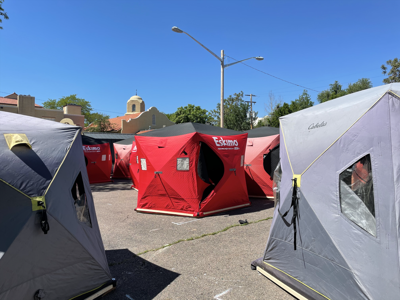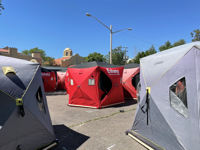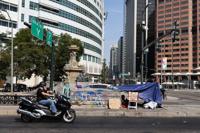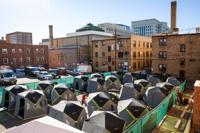Denver is set to spend $3.9 million on managed homeless campsites through the end of this year after the City Council approved the expansion of the program Monday.
The expanded contract will fund at least four camps sheltering approximately 370 people through Dec. 31, run by the Colorado Village Collaborative. The organization currently runs three camps, called Safe Outdoor Spaces, in the parking lots of the Human Services East Office, Regis University and Denver Health.
There have been six managed camps in the city since the program began in late 2020 as a response to the COVID-19 pandemic increasing unsheltered homelessness and raising public health concerns about indoor congregate shelters. To date, 242 people have lived in the camps for durations between 30 days and 14 months.
“The folks who are currently in Safe Outdoor Spaces have a safer place to be,” said Angie Nelson, director of the Denver Department of Housing Stability. “Couples are able to stay together, folks are able to be sheltered with their pets. We’ve really found this to be a valuable tool to add to the spectrum of shelter services to help meet people where they’re at.”
The council passed the contract in an 11-1 vote, with one council member absent and Councilwoman Amanda Sawyer voting no. Several council members said the camps are not an ideal situation, but they are an inexpensive, immediate option to address homelessness while the city invests in long-term solutions like affordable housing.
The camps are fenced off and staffed 24/7, providing residents with heated tents, bathrooms, laundry services, internet, food, dental care, COVID-19 testing and services for finding permanent housing.
“I’m not thrilled to death with the Safe Outdoor Spaces. I wish we didn’t need them. People deserve dignified housing with a door that shuts,” Councilman Paul Kashmann said. "While they’re not my wildest dream, they’re well managed and I think they’re an alternative that needs to be part of our toolkit.”
Of the 242 total camp residents, 47 have transitioned into more stable housing and another 20 have been connected to housing vouchers and are currently waiting. In 2022, Colorado Village Collaborative aims to connect at least 30% of those leaving the camps to more stable housing.
Sawyer, who has voted against funding the camps in the past, said traditional indoor shelters are a better investment for the city and criticized the Denver Department of Housing Stability, saying the department “passed up” the chance to buy a $500,000 motel in her district that would’ve permanently housed 60 people.
“I’ve heard a lot of conversation tonight, comments from council members saying that there aren’t other options, but there are. There have been. We’ve seen it in District 5, and we’ve seen HOST pass on those,” Sawyer said. “We all want to help people. There’s absolutely no question about that. However, we have different choices in the priorities of how we want to do that.”
Nelson said the department is “aggressively” tracking down every viable housing opportunity and she doesn’t know what motel Sawyer is referring to, to which Sawyer said Nelson is “deflect(ing) from the truth for the public.”
Of current camp residents, 98% were previously living unsheltered such as in illegal camps on the street, not in the city’s homeless shelters, according to Colorado Village Collaborative. In addition, despite community fears, the organization said there have been no crimes committed by residents against surrounding neighborhood property or people in any of the six camps.
“If every Denver resident watching this debate tonight asks themselves, would they rather have people sleeping in parks, sidewalks, alleys near their home, or would they rather have folks in an organized environment, a sanitary environment with supervision 24 hours a day with staff and with services to help them on a journey to stability?” Councilwoman Robin Kniech said. “That’s the choice we face today.”
The $3.9 million will come from COVID-19 recovery funds from the American Rescue Plan Act, raising the total project funding to just under $4.8 million.
On Monday, the City Council also approved contracts to allocate $1.025 million to U.S. Motels Denver North for overflow homeless shelters, $1.7 million to Elevation Community Land Trust for income-restricted homeownership units and $3.732 million to Colorado Village Collaborative for the Denver Street Outreach Collaborative and Strategic Outreach to Large Encampments programs.












 Your Privacy Choices
Your Privacy Choices